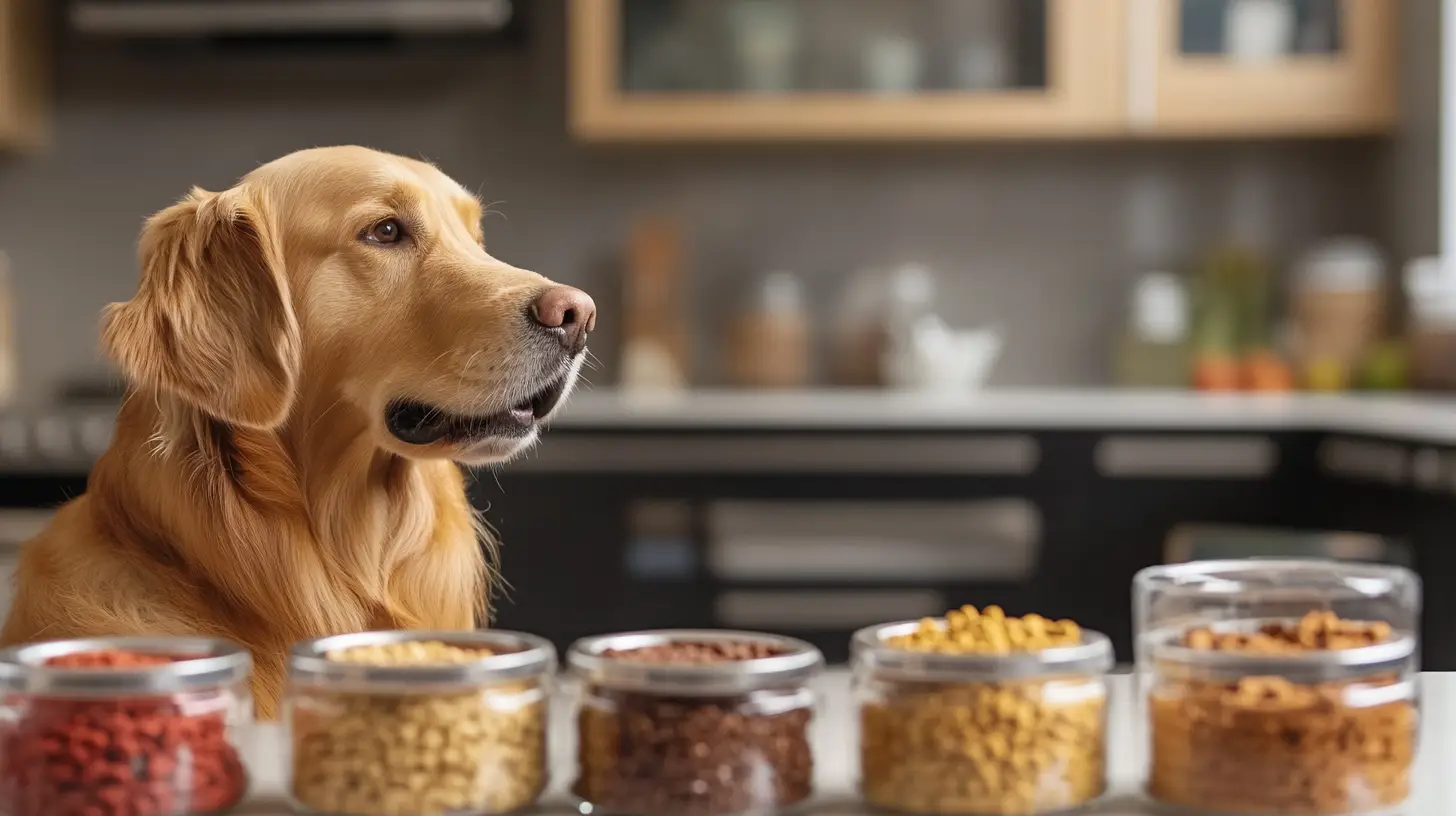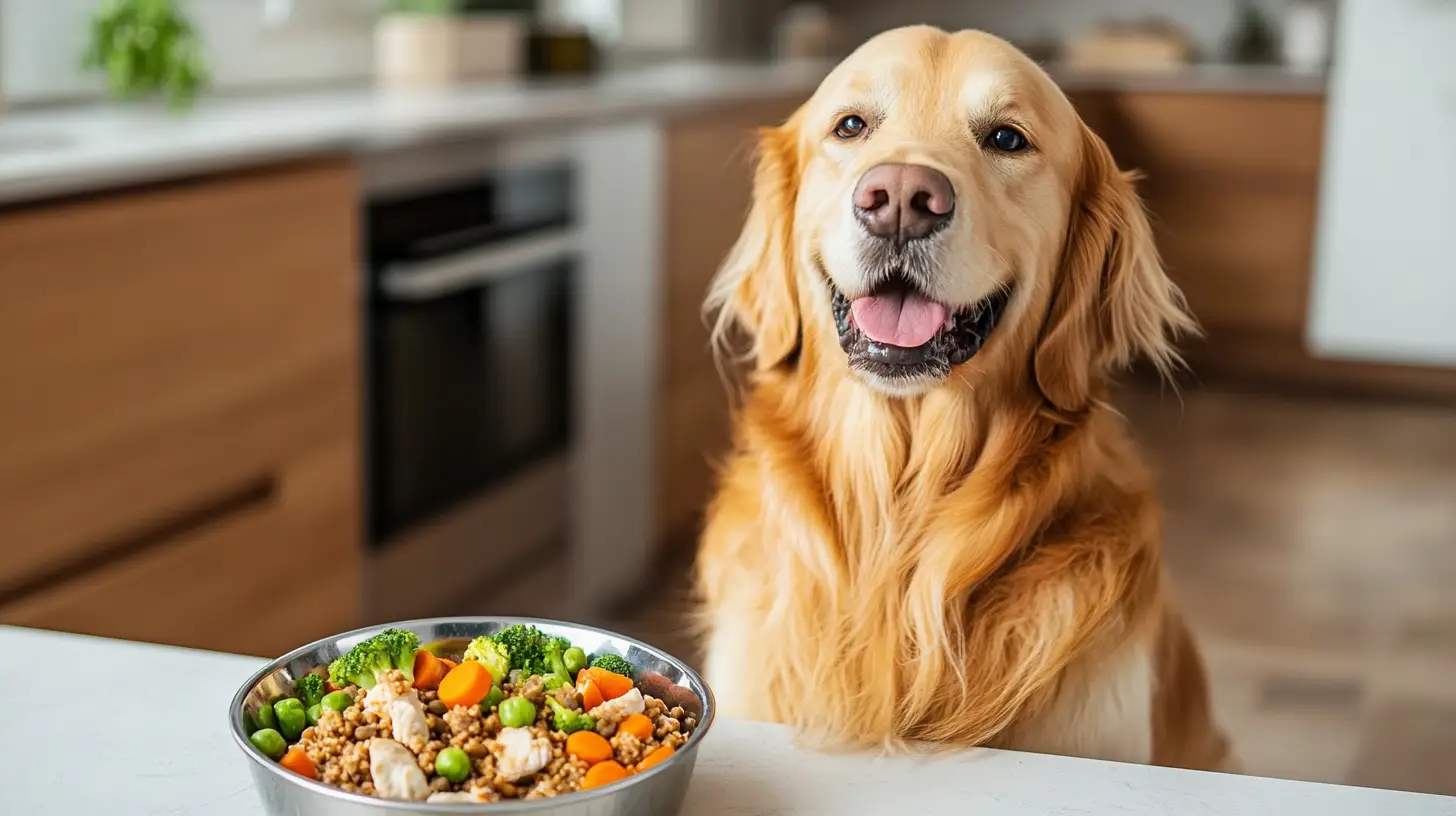ADVERTISEMENT
Golden Retrievers are known for their friendly nature, intelligence, and boundless energy, but keeping them healthy and happy requires more than just playtime and exercise. Proper nutrition plays a crucial role in maintaining their well-being, helping them grow strong, stay active, and avoid common health issues like obesity and joint problems.
In this guide, we’ll explore the nutritional needs of Golden Retrievers, the essential nutrients they require, and the best food options to keep them in peak condition. Whether you’re caring for a Golden Retriever puppy, adult, or senior, providing them with a balanced diet tailored to their specific needs is key to ensuring a long, healthy life.
Essential Nutrients for Golden Retrievers
Golden Retrievers need a well-balanced diet that includes all the essential nutrients to maintain their energy levels, support their joints, and keep their coats shiny. Here are the key nutrients every Golden Retriever requires:
Protein for Muscle Health
Protein is one of the most important components of a Golden Retriever’s diet. It supports muscle development and maintenance, which is especially important for such an active breed. High-quality protein sources like chicken, turkey, beef, and fish provide the amino acids necessary for building strong muscles.
ADVERTISEMENT
- Best Sources: Chicken, turkey, salmon, beef, lamb
Healthy Fats for Skin and Coat
Golden Retrievers are prone to skin issues, so ensuring they receive enough healthy fats is essential. Omega-3 and Omega-6 fatty acids are particularly beneficial for maintaining a shiny coat and reducing inflammation, which can help prevent skin problems.
- Best Sources: Fish oil, flaxseed, chicken fat
Carbohydrates for Energy
Carbohydrates are a great source of energy for Golden Retrievers, especially if they are active. Carbs help sustain energy levels throughout the day and support healthy digestion when sourced from high-quality grains or vegetables.
- Best Sources: Sweet potatoes, brown rice, oats, peas
Vitamins and Minerals for Overall Wellness
Vitamins and minerals are essential for supporting a Golden Retriever’s immune system, bone health, and metabolic functions. A diet rich in antioxidants, vitamins (such as A, C, and E), and minerals (like calcium and phosphorus) helps keep your dog in optimal health.
- Best Sources: Carrots, spinach, blueberries, pumpkin
Top Recommended Dog Foods for Golden Retrievers
Choosing the right dog food for your Golden Retriever is essential to meeting their nutritional needs. Whether you prefer dry kibble, wet food, or raw diets, there are plenty of high-quality options available. Here are some of the best dog food options to consider for your Golden Retriever:

Best Dry Food Options
Dry kibble is a popular choice for Golden Retrievers due to its convenience and shelf life. Look for high-quality dry dog foods that contain real meat as the first ingredient, along with healthy fats and digestible carbohydrates. Some of the best options include:
- Royal Canin Golden Retriever Adult
Specially formulated for Golden Retrievers, this kibble supports healthy skin, coat, and joints with a tailored blend of nutrients. It contains Omega-3 fatty acids for a shiny coat and glucosamine for joint health. - Hill’s Science Diet Adult Large Breed
This dry food is designed for large breeds like Golden Retrievers and includes a balanced blend of high-quality protein and natural ingredients to promote muscle maintenance and overall health. - Blue Buffalo Life Protection Formula
Made with real chicken, brown rice, and vegetables, this formula provides a holistic approach to nutrition. It’s free from artificial additives and contains antioxidant-rich ingredients for immune support.
Best Wet Food Options
Wet food can be a great addition to a Golden Retriever’s diet, especially if they have difficulty chewing dry kibble or need extra hydration. Here are a few top wet food options:
- Merrick Grain-Free Wet Dog Food
Packed with real deboned beef or chicken, Merrick’s wet food is grain-free and high in protein. It’s a great choice for dogs with food sensitivities or allergies. - Wellness CORE Grain-Free Hearty Cuts
This protein-rich wet food contains real meat and vegetables in a savory gravy, making it both nutritious and palatable. It’s grain-free and fortified with vitamins and minerals for overall health.
Grain-Free and Raw Food Options
For Golden Retrievers with food sensitivities or allergies, grain-free or raw diets may be a good option. These diets focus on natural, whole ingredients to support digestion and health.
- Instinct Raw Boost Mixers
These freeze-dried raw pieces can be added to your dog’s kibble for an extra boost of raw nutrition. They contain real meat and vegetables and are ideal for picky eaters or dogs with sensitive stomachs. - The Honest Kitchen Dehydrated Grain-Free Food
This dehydrated dog food is made from minimally processed, whole-food ingredients. Just add water to rehydrate and serve a balanced, grain-free meal packed with protein, fiber, and nutrients.
Feeding Guidelines for Golden Retrievers
Feeding your Golden Retriever the right amount of food is just as important as choosing the right type of food. Golden Retrievers are prone to weight gain, so it’s essential to follow feeding guidelines based on their age, activity level, and size to keep them at a healthy weight.

How Much Food Should Golden Retrievers Eat?
The amount of food your Golden Retriever needs will depend on their age, size, and activity level. Golden Retrievers are large, active dogs, so they typically require more calories than smaller breeds. However, overfeeding can lead to obesity, which can exacerbate joint problems.
- Puppies: Golden Retriever puppies need more frequent meals to support their rapid growth and development. Feed them 3-4 meals per day, adjusting the amount as they grow. For example, a 3-month-old puppy may need around 2-3 cups of food per day, while a 6-month-old puppy may require 3-4 cups.
- Adults: Adult Golden Retrievers typically need 2 meals per day. The amount can range from 2.5 to 4 cups of food per day, depending on their activity level. More active dogs will require more calories to maintain energy levels.
- Seniors: As Golden Retrievers age, their metabolism slows down, so they will need fewer calories. Senior dogs should still be fed twice a day, but the portion sizes should be reduced slightly to prevent weight gain. Around 2-3 cups of food per day is usually sufficient for older dogs.
Feeding Schedules for Puppies, Adults, and Seniors
Creating a consistent feeding schedule helps regulate your dog’s digestion and prevents overeating. Here’s a general feeding schedule for Golden Retrievers based on their life stage:
- Puppies (up to 6 months): Feed your puppy 3-4 small meals per day to provide steady energy and support healthy growth.
- Adults (1-7 years): Feed adult Golden Retrievers 2 meals per day, typically in the morning and evening. This helps maintain a steady metabolism and prevents hunger-related behavior between meals.
- Seniors (7+ years): Continue feeding senior Golden Retrievers twice per day, but monitor their weight and adjust portions to prevent excess weight gain as their activity level decreases.
Ingredients to Look For
When choosing the best dog food for your Golden Retriever, it’s important to focus on high-quality ingredients that meet their specific nutritional needs. The right ingredients will support their overall health, maintain a healthy coat, and prevent common issues like joint problems and allergies. Here are some key ingredients to look for in Golden Retriever dog food:
High-Quality Protein Sources
Protein is vital for muscle development and energy, especially for an active breed like Golden Retrievers. Look for real, named animal proteins (e.g., chicken, beef, lamb, or salmon) as the first ingredient in your dog’s food. These proteins provide essential amino acids that help maintain lean muscle mass.
- Best Sources: Chicken, turkey, beef, lamb, salmon, duck
Essential Fatty Acids for Joint and Coat Health
Golden Retrievers benefit greatly from omega-3 and omega-6 fatty acids, which support healthy skin, a shiny coat, and strong joints. These fatty acids also have anti-inflammatory properties, which can help prevent and manage joint issues like arthritis.
- Best Sources: Fish oil, flaxseed, chicken fat, salmon oil
Digestible Carbohydrates for Sustained Energy
Golden Retrievers need a steady supply of energy to fuel their active lifestyle. High-quality, digestible carbohydrates are important for providing energy without causing digestive issues. Whole grains and vegetables are excellent sources of fiber and energy that can support your dog’s overall health.
- Best Sources: Brown rice, sweet potatoes, oats, barley, peas
Antioxidant-Rich Fruits and Vegetables
Fruits and vegetables provide important vitamins, minerals, and antioxidants that support your Golden Retriever’s immune system and overall well-being. These ingredients also promote healthy digestion and help maintain a healthy weight.
- Best Sources: Blueberries, spinach, carrots, pumpkin, apples
Ingredients to Avoid
While it’s important to focus on high-quality ingredients in your Golden Retriever’s food, it’s equally crucial to avoid certain ingredients that can be harmful to their health. Some dog foods contain fillers, additives, and low-quality proteins that offer little nutritional value and may even cause allergies or digestive issues.
Low-Quality Fillers and Additives
Many lower-quality dog foods use fillers like corn, soy, and wheat, which provide little nutritional value and can be difficult for dogs to digest. These ingredients are often used to bulk up the food cheaply but don’t provide the same level of nutrition as whole grains or vegetables.
- Avoid: Corn, soy, wheat, artificial colors, flavors, and preservatives
By-Products and Unnamed Meat Sources
Some dog foods use meat by-products or unnamed animal meals (e.g., “meat meal” or “animal by-products”), which can be low-quality sources of protein. These ingredients often include parts of the animal that are less nutritious, and they may not provide the same health benefits as whole, named meat sources.
- Avoid: Meat by-products, animal digest, unnamed meat sources
Foods That Trigger Allergies or Digestive Issues
Golden Retrievers are prone to food allergies and sensitivities, which can cause skin irritations, digestive upset, and other health problems. Common allergens in dog food include grains like wheat, as well as certain proteins like beef or dairy. If your dog shows signs of allergies, such as itching or gastrointestinal issues, it’s best to switch to a limited-ingredient or grain-free formula.
- Avoid: Wheat, soy, artificial additives, and common allergens like beef or dairy if your dog has sensitivities
Common Health Concerns in Golden Retrievers and Diet Solutions
Golden Retrievers are prone to several health issues, many of which can be managed or mitigated through proper nutrition. Feeding your dog a balanced diet that addresses these concerns can help improve their quality of life and extend their lifespan.
Managing Obesity Through Nutrition
Golden Retrievers have a tendency to gain weight, especially as they age or if they aren’t getting enough exercise. Obesity can lead to more serious health problems, such as joint issues, heart disease, and diabetes. Choosing a diet that supports healthy weight management is essential.
- Diet Solution:
Opt for dog foods that are lower in fat and calories but high in protein to help maintain lean muscle mass. Look for foods that include fiber-rich ingredients, such as sweet potatoes or brown rice, to help your dog feel full without overeating.
Dietary Tips for Skin and Coat Health
Golden Retrievers are prone to skin issues, including allergies and dermatitis. A poor diet can exacerbate these conditions, leading to dry, flaky skin and a dull coat. Ensuring that your dog’s food contains omega-3 and omega-6 fatty acids can make a significant difference.
- Diet Solution:
Choose foods rich in fatty acids, like salmon oil or flaxseed, to promote healthy skin and a shiny coat. Antioxidant-rich ingredients, such as blueberries or spinach, can also help support skin health by reducing inflammation.
Joint Health and Anti-Inflammatory Foods
Golden Retrievers are a large breed that can suffer from joint issues such as hip dysplasia and arthritis. Maintaining your dog’s joint health through nutrition is crucial, especially as they age.
- Diet Solution:
Look for dog foods that include glucosamine and chondroitin, which are known to support joint health. Additionally, foods rich in omega-3 fatty acids can help reduce inflammation and improve joint mobility.
FAQs About Dog Food for Golden Retrievers
When it comes to feeding your Golden Retriever, there are many common questions that dog owners have. Here are answers to some frequently asked questions to help guide you in providing the best nutrition for your dog.
What food is best for Golden Retrievers?
The best food for Golden Retrievers is one that includes high-quality protein sources, healthy fats, and digestible carbohydrates. Look for dog foods that feature real meat (like chicken or salmon) as the first ingredient, along with added vitamins and minerals for overall wellness. Some recommended brands include Royal Canin Golden Retriever Adult, Hill’s Science Diet, and Blue Buffalo Life Protection Formula.
What should a Golden Retriever eat daily?
A balanced diet for a Golden Retriever should include a mix of high-quality protein, healthy fats, and carbohydrates to provide energy. Adult Golden Retrievers typically need 2 to 4 cups of food per day, split into two meals. Puppies require more frequent meals and larger portions as they grow. Make sure to adjust the portions based on your dog’s activity level and weight to avoid overfeeding.
What should a Golden Retriever not eat?
Golden Retrievers should avoid foods that contain low-quality fillers like corn, soy, and wheat, as well as artificial additives and preservatives. Additionally, steer clear of common allergens like beef or dairy if your dog shows signs of sensitivity. Certain human foods, such as chocolate, onions, grapes, and garlic, are toxic to dogs and should always be avoided.
Is Blue Buffalo good for Golden Retrievers?
Yes, Blue Buffalo is a good option for Golden Retrievers. Their formulas include high-quality ingredients, such as real chicken and brown rice, and are free from artificial additives. Blue Buffalo Life Protection Formula is a popular choice for Golden Retrievers due to its balanced blend of protein, fat, and fiber, which supports overall health and digestion.
Conclusion
Feeding your Golden Retriever a well-balanced, nutritious diet is essential for their overall health and longevity. By focusing on high-quality ingredients such as real meat, healthy fats, and digestible carbohydrates, you can provide your dog with the nutrition they need to stay active, maintain a healthy coat, and avoid common health issues like obesity and joint problems.
Whether you choose dry food, wet food, or a combination of both, always prioritize the specific nutritional needs of your Golden Retriever. Regularly monitor your dog’s weight and adjust portion sizes as needed to keep them in optimal shape. With the right food and care, your Golden Retriever will enjoy a long, healthy, and happy life.
